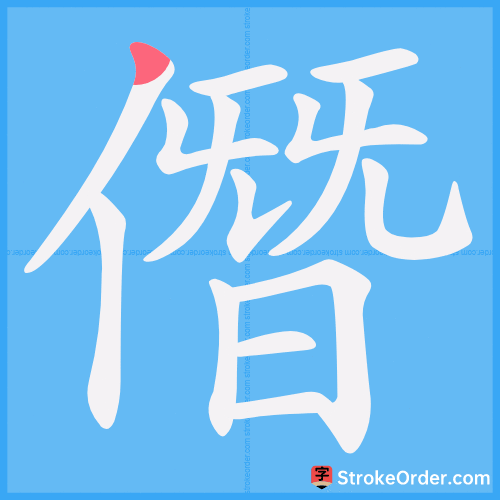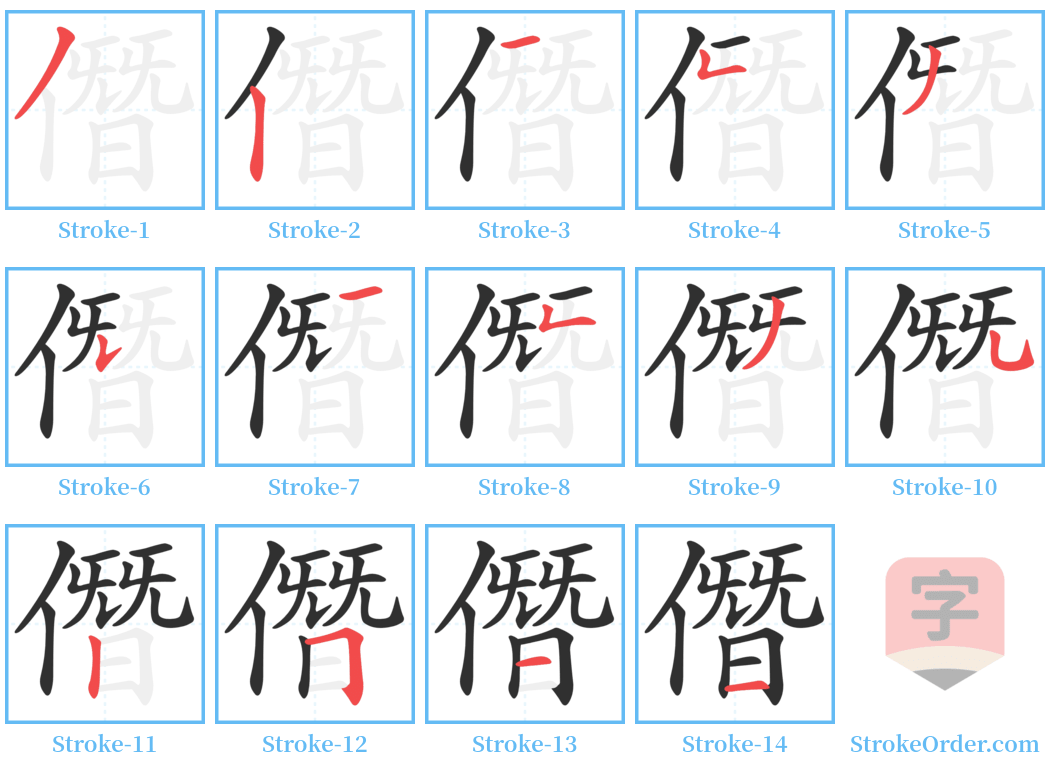僭 Stroke Order
Animated Stroke Order of 僭

Stroke Order Diagrams for 僭

Step-by-Step Handwriting Guide for 僭

Learn to Write Chinese Characters with Video Tutorials
Watch the video of writing the Chinese character "僭", learn the correct stroke order (笔顺) of the character "僭", and master the standard way of writing the character "僭".
Free Printable Handwriting Practice with Stroke Order: 僭
Printable Writing Practice Worksheet of "僭" in Portrait Orientation (Tian Zi Ge)

Printable Writing Practice Worksheet of "僭" in Landscape Orientation (Tian Zi Ge)

Information of 僭
Pinyin
jiàn
Radical
亻
Strokes
14 strokes
Usage
★★★★
Definition
usurp
僭 [jiàn]
1. Exceeding one's responsibilities; in ancient times, it referred to someone of lower status usurping the titles, rituals, or items belonging to someone of higher status.
- 超越本分,古代指地位在下的冒用在上的名义或礼仪、器物。
2. Hypocritical; sham; undue; fault; crime; in disorder; modest.
- 虚伪 ([En.] sham; hypocritical)
- 过分 ([En.] undue)
- 差失,罪过; 乱 ([En.] fault; crime; in disorder)
- 表示自谦 ([En.] modest)
3. To exceed one’s official responsibilities, acting under the title or authority of someone of higher status.
- 超越身分,冒用在上者的职权、名义行事 ([En.] exceed one’s responsibility of office)
4. Examples:
- 僭乱 (sham and disorder)
- 僭词 (words of deceit)
- 僭溢 (excessive)
- 僭奢 (exorbitantly luxurious)
5. Related quotations:
- 《左传·昭公八年》:僭而无征 (Usurping without evidence).
- 《诗·商颂·殷武》:不僭不滥,不敢怠遑 (Do not exceed or abuse; do not dare to be negligent).
6. Other derived meanings:
- 僭先 (acting ahead of propriety; a humble term)
- 僭忝 (feeling ashamed of being in a superior position; a humble term)
- 僭易 (presumptuous; a humble term)
- 僭谈 (humble term; speaking beyond one’s station)
7. Use in a contextual example:
- 僭越 (acting beyond one’s infield)
- 僭拟 (comparing oneself to those of higher status)
- 僭居 (usurping a position)
- 僭位 (occupying a superior position unlawfully)
Input Method for 僭
Pinyin
jian4
Wubi
waqj
Cangjie
omua
Zhengma
nhrk
Four Corner
21261
Unicode
U+50ed
Same Pronunciation Characters